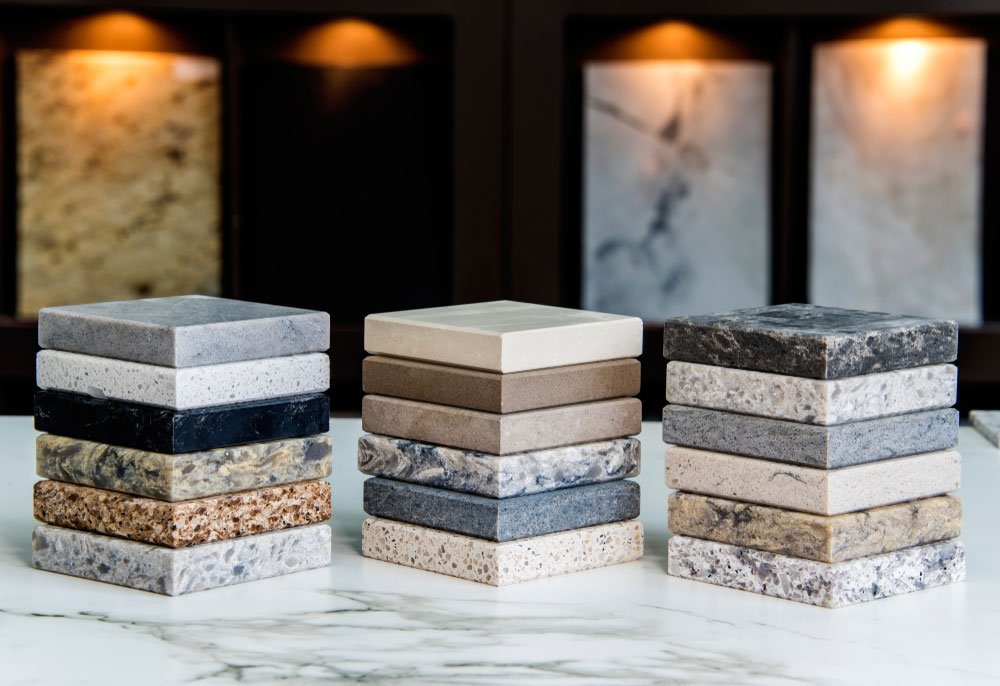The answer isn’t as simple as one being better than the other. Instead, it depends on individual factors and preferences related to lifestyle, budget, and maintenance. This article explains the differences between the two countertop materials, including their durability, maintenance needs, cost, and design potential, so you can choose the right fit for your home.
Quartz vs. Granite Countertops: What’s the Difference?
Before comparing these materials, it’s essential to understand what sets them apart.
- Granite is a natural stone quarried from the earth. Each slab has unique veining, color variations, and textures. Each slab and cut is truly one of a kind.
- Quartz countertops are engineered surfaces composed of ground natural quartz combined with resins and pigments. This manufacturing process yields uniform patterns and a wide range of colors, which are not always found in natural stone.
Both options are gorgeous, but their composition affects their performance, upkeep, and cost.
Wondering how to measure your kitchen countertops before replacing them? Check out this blog >>
Is a Quartz Countertop Better Than Granite?
It depends. What does “better” mean to you?
- Quartz is better for low-maintenance lifestyles. It doesn’t need sealing, resists staining, and is easy to clean. So if you have a busy household, this may be the best choice.
- Granite is superior in terms of natural beauty and uniqueness. If you love one-of-a-kind patterns and the appeal of real stone, you may lean toward this option more.
In terms of strength, both are equal. They can withstand daily wear and tear for decades.
Is a Quartz Countertop Cheaper Than Granite?
Many homeowners assume quartz is always the more expensive option. That’s most often true, but not always.
- Quartz is typically priced in the mid-to-high range, but the price includes the convenience of low maintenance and long-term savings on upkeep.
- Granite prices can start lower than those of quartz, but rare colors and thicker slabs can quickly increase the costs.
In short, granite may be cheaper upfront than quartz, but quartz can save time and money in the long run due to its low maintenance requirements.
Full Comparison: Quartz vs. Granite Countertops
Here’s a simple chart to highlight the pros and cons of each.
| Feature | Quartz Countertops | Granite Countertops |
| Durability | Highly durable, non-porous, resistant to stains and chips | Durable but porous; may stain if not sealed |
| Maintenance | Virtually maintenance-free; no sealing required | Requires periodic sealing to prevent staining |
| Design Variety | Wide range of consistent patterns and colors | Unique natural variations; no two slabs are alike |
| Cost | Typically $70-120 per sq. ft. | Typically $60-$100 per sq. ft. |
| Heat Resistance | Good, but avoid extreme heat without protection | Excellent natural heat resistance |
| Longevity | 25+ years with proper care | 25+ years with proper care |
Quartz Countertop Brand Spotlight: Cambria
If quartz seems like the right choice for you, we’d love to recommend Cambria as a top brand. Known for exceptional durability, stunning designs, and virtually maintenance-free care, Cambria surfaces combine beauty and performance.
Additionally, Cambria is the only family-owned, American-manufactured producer of natural stone surfaces. They are deeply committed to quality and customer care. The company also incorporates environmentally friendly initiatives into its processes and offers a lifestyle warranty on all countertop products.
Learn more & view other countertop brands we carry >>
Which Countertop Material Is Right for You?
Your countertop material choice ultimately depends on your lifestyle, budget, and design preferences. Whether you lean toward granite’s timeless elegance or quartz’s modern convenience, our kitchen design team can help guide the selection process and provide access to high-quality options, like Cambria Quartz.
Contact us online to start your project and explore your options.

